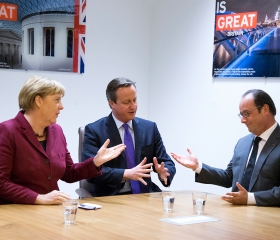Russia’s relations with the West painfully severed by the Ukraine crisis, Moscow has been bolstering the Eastern dimension of its foreign policy. It is building a closer partnership with China and demonstrating deeper interest in Asian affairs overall. This has spurred genuine concern in Europe as politicians and observers are wondering how permanent, decisive and final this pivot is and what should European leaders make of it. Asia asks these questions as well, wondering whether Russia’s current policy choices are for long.
Russia’s relations with the West painfully severed by the Ukraine crisis, Moscow has been bolstering the Eastern dimension of its foreign policy. It is building a closer partnership with China and demonstrating deeper interest in Asian affairs overall. This has spurred genuine concern in Europe as politicians and observers are wondering how permanent, decisive and final this pivot is and what should European leaders make of it. Asia asks these questions as well, wondering whether Russia’s current policy choices are for long.
First of all, the very word ‘pivot’ was borrowed from American vocabulary used to describe the Obama administrations relocation of diplomatic and military resources from the Middle East and other regions to the Asia Pacific. Later on, the term ‘pivot’ was substituted for ‘rebalance’ precisely because the former sounded too negative regarding the traditional areas of US presence. The Pivot was too much about the ‘from’ and less about the ‘to’, while the Rebalance was rhetorically much better.
The reason why we should see this difference clearly is that Russia’s new Asia policy is also more of a rebalance than a pivot. It is difficult to argue that worsened relations with Europe sped up Russia’s eastward push. Political differences spilled over to trade and investment. It turned out that economic interdependence does not guarantee sound political relations and, conversely, a crisis may well disrupt good business. And since any substantial alignment of geopolitical and ideological views with the West is nowhere in our sight, transferring stakes to other regions and diversifying Russia’s international portfolio seems rather pragmatic.
East Asia is the first choice for such a hedging policy, when you consider Russia's grand state-building strategy. It involves bringing about qualitatively new economic development for the country's Siberia and the Far East - a vast but scarcely populated region beyond the Ural mountains bordering Pacific Asia. The Russian leadership hopes that a diplomatic push to China and other East Asian states will create a favorable environment for a wave of investments to the lagging eastern extremities of the country.
The success of this policy is a whole other question. The very fact that you are reading this article is proof that the pivot has indeed produced visible effects. Among the impressive manifestations of Russia’s successes in Asia are mutual attendance by Vladimir Putin and Xi Jinping of last year's World War II Victory parades in Moscow and Beijing, as well as a declaration on the convergence of Russia and China's geoeconomic super-initiatives - the Eurasian Economic Union and the Silk Road Economic Belt. These big gestures along with new oil and gas contracts and arms trade deals caused some Europeans to see these developments as Russia leaving Europe for good.
Let's have one thing clear. Europe will see a relative decline of Russian diplomatic attention in the long run. As Russia keeps developing economically (and I still have hope for that) it is sure to produce a better diversified foreign policy, one in sync with the goal of promoting the Far East and the growing importance of the Asia Pacific for global affairs.
Still, Europe is certain to remain at the top of Russia's priorities thanks to the same good old geography. Europe is an essential partner in Russia's economic growth and working relations with the EU are essential for the Eurasian Union to function properly. At the same time strategically, Russia is indispensable for European security. Without constructive engagement with Russia, any kind of balance of power in Europe will simply not be viable, as demonstrated by the Ukraine crisis. Such indispensability of Russia is far from being the fact in Asia, at least for the time being.
In practical terms, this means that Russia will continue to divest from European affairs, but only to make its development strategy stronger, not weaker. Quite similar to the European Union, which seeks to diversify its energy sources, Russia is seeking to diversify its exports markets – but even this intention means exporting 30 per cent of all oil and gas to Asia. 30, not 70. Realistically speaking, Asian partners will not rush to pour money in Russian projects as long as Moscow’s strained relations with the West increase risks for the investors. Moreover, the Russian Far East (RFE) will have to compete with other markets – like Southeast Asia – for Chinese, Japanese and South Korean businesses, which are not very well familiar with Russia simply because it was basically absent from the region for decades. This is why it does not really come as a surprise that Netherlands are currently the number one investor in the RFE.
All of this does not mean that Russia’s relations with the West will not get better. The current state is awful and unnatural. But for Russia not to develop a better Asian presence is no less unnatural. Ideally, Russia would embark upon a program of domestic economic modernization paired with international trust-building initiatives. It would make the country an attractive partner for both Asia and Europe, the latter always having the benefit of common culture and history.
In the meantime, we have to start thinking about the ‘Why’, not the ‘From Whom’ or ‘To Whom’.
This article was originally published in German by the Koerber Foundation.






